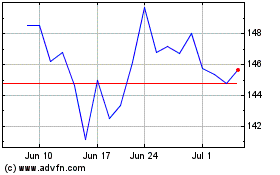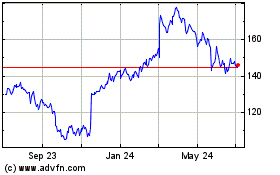Today's Top Supply Chain and Logistics News From WSJ
December 14 2017 - 7:25AM
Dow Jones News
By Paul Page
Sign up: With one click, get this newsletter delivered to your
inbox.
The push by retailers toward delivery services is picking up
speed. Target Corp's agreement to acquire grocery delivery startup
Shipt Inc. takes consolidation in the retail-fulfillment arena to a
new level, expanding the competition that so far has seen
Amazon.com Inc. and Wal-Mart Stores Inc. pull together services
aimed at getting goods to customers' homes faster and more
efficiently. Shipt, like rival Instacart, uses thousands of
contractors to buy products at retail stores and deliver them to
consumers, the WSJ's Khadeeja Safdar writes, and pulls in products
from local stores, including grocers like Kroger Co. and Costco
Wholesale Corp. The $550 million deal will help Target quickly
expand its delivery service, including offering same-day delivery
from about half its Target stores by early 2018. Target has been
struggling to scale up its e-commerce operations, and the deal may
help the retailer build up that business by essentially using its
stores as virtual distribution centers and Shipt's operation as the
fulfillment arm.
Retailer Zara's trend-setting fast-fashion supply chain may be
fraying at the edges. Profit margins at parent company Inditex SA
are narrowing even as sales are still growing, the WSJ's Jeannette
Neumann reports, a sign that the cost pressures of online sales and
delivery are weighing on a company known for its logistics smarts.
The company sources and produces the bulk of its garments close to
home, and delivers to stores in as little as two weeks -- a
rapid-fire turnaround that has transformed Zara's parent company
into one of the world's most profitable retailers. Inditex is being
whipsawed by several big international forces, including shifting
currency values, but some analysts believe the cost of delivery for
its growing online sales also is cutting into profits. The company
is testing various cost-saving strategies, including a
click-and-collect kiosk. But the stress on margins suggests that
even Zara's pioneering supply-chain strategy won't fully insulate
the company from the realities of digital commerce.
The world's most ambitious free-trade area is colliding with a
surge in economic nationalism. From the nationalization of a
shipyard in France to strict new rules for chocolates made in
Italy, new barriers are going up in the supposedly borderless
28-country European Union, the WSJ's Valentina Pop writes. The
actions are overturning a generation of moves toward trade
liberalization -- and driving countries further away from a
well-functioning common market. The new trade hurdles increase the
cost of doing business, and already appear to be disrupting
cross-border supply chains and discouraging multinational
investments. The retreat is coming in slow steps through one
administrative rule after another, and as big actions in the U.S.
and the U.K. look to more fully reverse two decades of moves toward
global trade liberalization. Many multinational companies that
thrived selling standardized products across dozens of countries
are now worried, saying they are now competing with voters, unions
and other groups that complain their home countries ceded too much
autonomy to Brussels.
COMMODITIES
There may be few companies more enthralled with the global push
for electric vehicles than coal-trading giant Glencore PLC. The
Swiss mining giant is already benefiting from a coming boom in
electric-vehicle production, which is driving up the value of
commodities critical to the vehicles, the WSJ's Scott Patterson
reports, giving a company that built its profile on coal a big
stake in technology meant to curb global warming. Tumbling coal
prices in recent years have dinged Glencore's earnings, but the new
commodities are becoming a primary earnings driver for the
business. The company now is projecting strong surges in production
of copper, cobalt and nickel, growth that will ripple across
commodity supply chains and reset distribution channels to funnel
the metals to factories that make batteries for the new generation
of cars. The biggest question hanging over Glencore now may be
whether there is enough cobalt supply in the pipeline to keep up
with forecast demand.
QUOTABLE
IN OTHER NEWS
The U.S. Federal Reserve will raise short-term interest rates
for the third time this year and remained on track for a similar
path next year. (WSJ)
U.S. consumer prices rose 0.4% in November largely because of
higher energy costs. (WSJ)
Ministers from 164 countries concluded negotiations at a World
Trade Organization meeting without agreements on how to modernize
global trade rules. (WSJ)
Toyota Motor Corp. expects half the auto maker's global sales
will come from hybrid and electric vehicles by 2030. (WSJ)
Toshiba Corp. and Western Digital Corp. settled a dispute over
Toshiba's sale of its memory-chip unit. (WSJ)
Sears Holdings Corp. extended the terms of a $400 million loan
while announcing a new planned borrowing to cover pension
contributions. (WSJ)
Mall-based retailer Charming Charlie LLC told a bankruptcy judge
it believes it can survive its trip through chapter 11. (WSJ)
Toyota is considering making batteries for electric vehicles
with Panasonic Corp. (Reuters)
Investigators blamed the El Faro disaster that killed 33
mariners on a "weak safety culture" at owners Tote Maritime and
poor decisions by the cargo ship's captain. (ABC)
Maersk Line is withdrawing from container shipping's
Transpacific Stabilization Agreement this month. (Shipping
Watch)
The Los Angeles City Council will consider blocking trucking
companies that use independent contractor drivers from working at
the Port of Los Angeles. (Daily Breeze)
Thirty-five nations agreed that action on shipping-industry
emissions should be aligned with objectives of the Paris climate
change accord. (Ship & Bunker)
South Korean container line Hyundai Merchant Marine will start
rail service to Europe through the Trans-China Railway. (Splash
24/7)
German technology-focused forwarder FreightHub took in $20
million in a Series A funding round. (TechCrunch)
An ongoing investigation on Islamic State weapons suggests some
of the group's munitions supply chain traces back to the U.S.
(Wired)
ABOUT US
Paul Page is deputy editor of WSJ Logistics Report. Follow him
at @PaulPage, and follow the entire WSJ Logistics Report team:
@brianjbaskin , @jensmithWSJ and @EEPhillips_WSJ. Follow the WSJ
Logistics Report on Twitter at @WSJLogistics.
Write to Paul Page at paul.page@wsj.com
(END) Dow Jones Newswires
December 14, 2017 07:10 ET (12:10 GMT)
Copyright (c) 2017 Dow Jones & Company, Inc.
Target (NYSE:TGT)
Historical Stock Chart
From Aug 2024 to Sep 2024

Target (NYSE:TGT)
Historical Stock Chart
From Sep 2023 to Sep 2024
